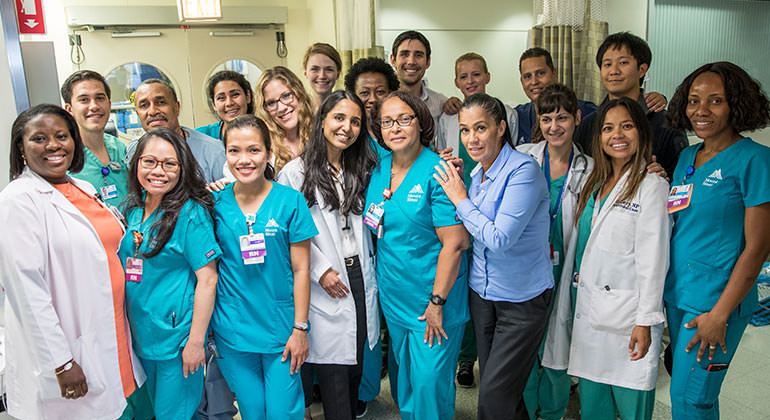
About Us
With the resources of the largest health care system in the New York metropolitan area, the Institute for Critical Care Medicine (ICCM) is uniquely poised to provide innovative and compassionate care to our most critically ill patients.
Comprised of 104 beds, our specialized critical care services include the:
- Cardiac Intensive Care Unit (CICU)
- Cardiothoracic Intensive Care Unit (CTICU)
- Cardiovascular Intensive Care Unit (CVICU)
- Medical Intensive Care Unit (MICU)
- Neuroscience Intensive Care Unit (NSICU)
- Surgical Intensive Care Unit (SICU)
- Transplant Intensive Care Unit (TICU)
Leading the Field in Critical Care Medicine
Our team consists of physicians who are board-certified in their fields of expertise—including anesthesiology, internal medicine, neurology, and cardiac surgery — as well as subspecialty expertise in critical care medicine. We work in conjunction with our patients’ primary care physicians, surgeons, nurses, social workers, rehabilitation therapists, palliative care specialists, and other support staff to provide extraordinary care. Our critical care nurses also receive specialty training and have extensive experience working in the complex ICU environment.
Due to the high volume of patients we receive, our specialists’ experience is of the highest quality. Each year, we care for approximately:
- 5,000 patients requiring mechanical ventilation
- 1,800 patients undergoing cardiac operations requiring bypass
- 1,500 patients requiring central venous catheterization
- 125 patients undergoing aggressive removal of the thrombus causing an acute stroke
- 100 patients undergoing liver transplantations
Rapid Response Team (RRT)
Rapid Response Team (RRT) is built on the success and framework of the MSH Stop Sepsis program, which has shown to be an effective early warning system for acute decompensation and sepsis. The goal of the RRT is to optimize patient outcomes as well as decrease mortality and cardiac arrest events in ICU and non-ICU patients.
The RRT physicians evaluate, treat, and assign levels of medical urgency to patients (also known as triage) throughout the hospital along with the RRT nurse practitioner, RRT respiratory therapist, critical care fellows, and other health care providers (including primary medical doctor and intensive care physicians) as necessary. A call can be made by any member of the hospital staff, patient, and/or family member by paging 1RRT (1778). Procedures that might be required at the bedside include:
- ACLS
- Arterial line insertion
- Cardioversion
- Central venous catheterization
- Chest tube insertion
- Lumbar puncture
- Paracentesis
- Thoracentesis
- Tracheal intubation
Vascular Access Service (VAS)
The Vascular Access Service (VAS) team consists of dedicated specialists who are experts in catheter management. They use an evidence-based approach to vascular access that will minimize risk of central line complications such as infections, thrombosis, and misplacement. VAS has shown to improve operational efficiencies as well as patient experience. There are three specialized teams of vascular access clinicians:
- Central Venous Access Service: Attending physician-led service for temporary central lines, PICCs, and HD catheters
- Peripheral Venous Access Service: An RN (registered nurse)-led service for bedside ultrasound guided peripheral lines focusing on maintenance and education
- Vascular Access Service Tunneled (VAST): Made up of surgery and IR (interventional radiology) physicians, the VAST team is highly-skilled in the placement of tunneled catheters and ports.
Biocontainment Unit
Shortly after an Ebola public health scare in New York City, a biocontainment unit was constructed by Mount Sinai to help patients who are suspected of having Ebola or other highly contagious diseases. Many of the MICU nurses helped develop extensive protocols for obtaining and transporting blood samples and providing treatment within this unit.
Advancing Research in Critical Care Medicine
As part of our commitment to clinical excellence and innovation, our mission also includes advancing critical care research and education. We are dedicated to finding new ways to improve the outcomes of all critical and life-threatening illnesses.
Housed within our ICUs and research laboratories, our Critical Care Fellowships are among the nation’s top training programs for graduates of anesthesiology, internal medicine, and neurology residencies who wish to pursue further training in this specialized field.